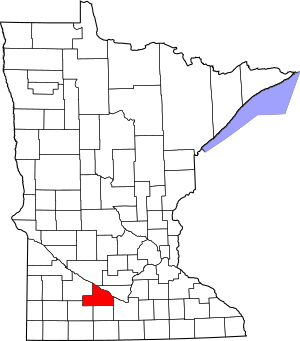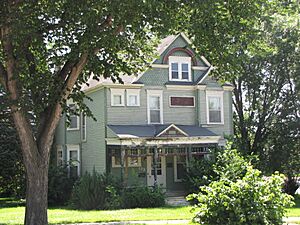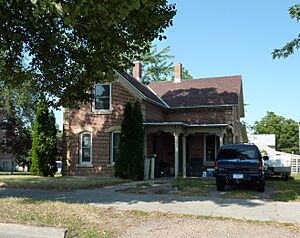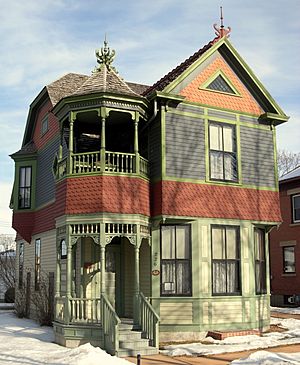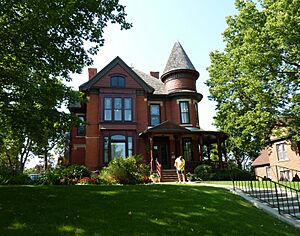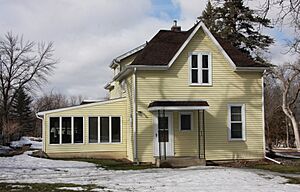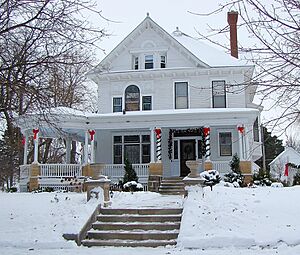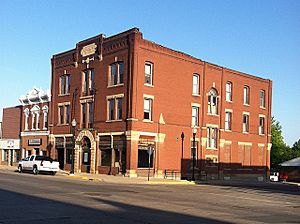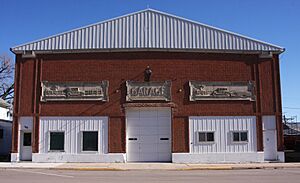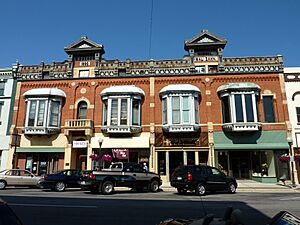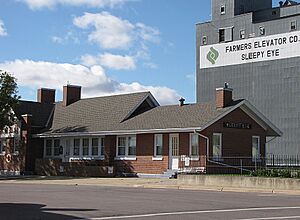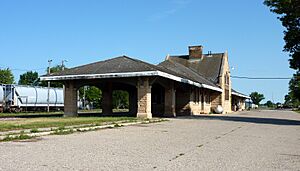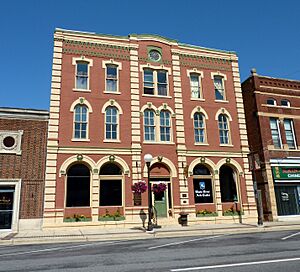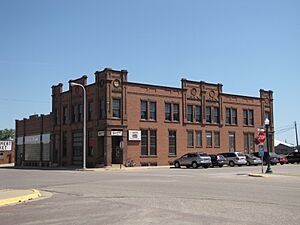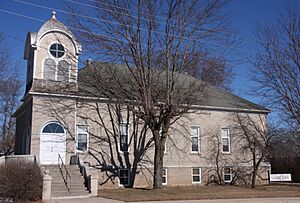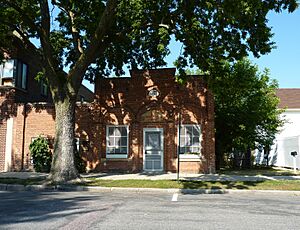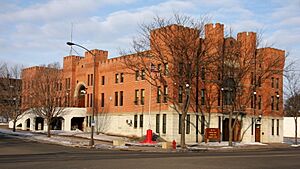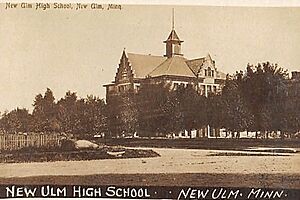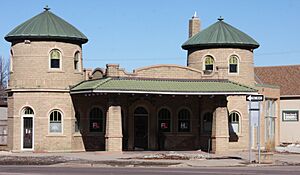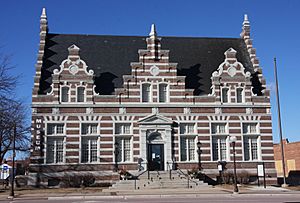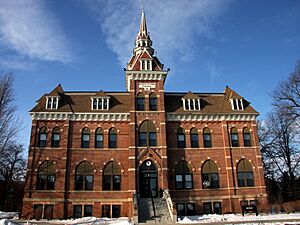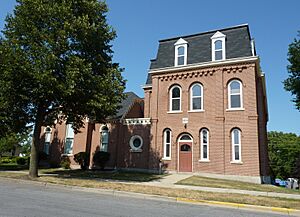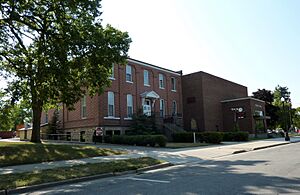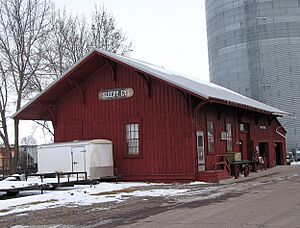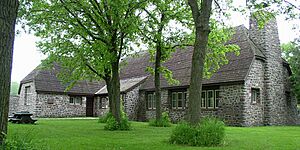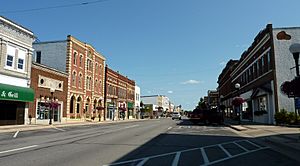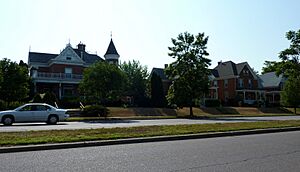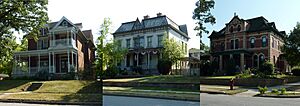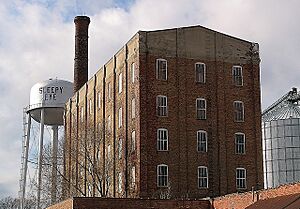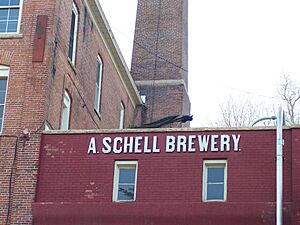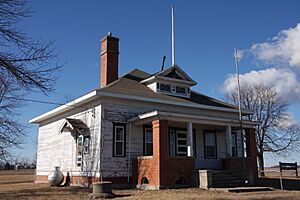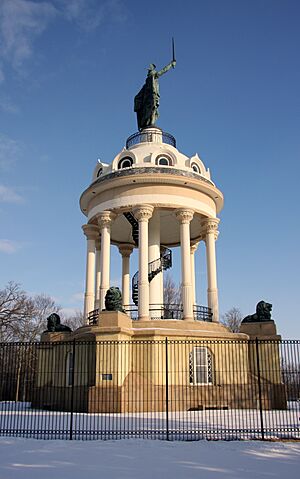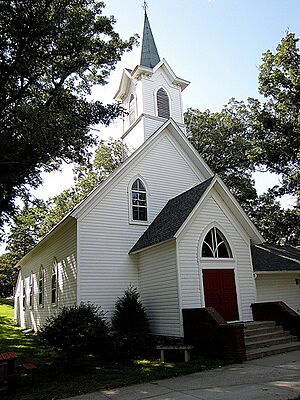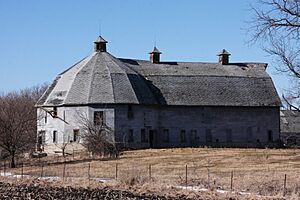National Register of Historic Places listings in Brown County, Minnesota facts for kids
Brown County, Minnesota, is home to many amazing places that are part of the National Register of Historic Places. This special list includes buildings, sites, and objects that are important to American history, architecture, archaeology, engineering, or culture. Think of it like a Hall of Fame for historic spots! There are 39 places in Brown County on this list, and each one tells a unique story about the past.
Contents
- Cool Historic Buildings in Brown County
- Homes with History
- Historic Business and Public Buildings
- C. Berg's Hotel
- Bjorneberg Garage
- Boesch, Hummel, and Maltzahn Block
- Chicago and North Western Depot (Sleepy Eye)
- Chicago and North Western Railroad Depot (New Ulm)
- Grand Hotel
- Kreitinger Garage
- Liberal Union Hall
- Melges Bakery
- New Ulm Armory
- New Ulm High School
- New Ulm Oil Company Service Station
- New Ulm Post Office
- Old Main, Dr. Martin Luther College
- St. Michael's School and Convent
- Turner Hall
- Winona and St. Peter Freight Depot
- Historic Districts and Parks
- Other Unique Historic Sites
- Former Listings
- Images for kids
Cool Historic Buildings in Brown County
Brown County has many old buildings that show us what life was like long ago. These places are protected because they teach us about the people and events that shaped the area.
Homes with History
Many houses in Brown County are on the National Register because of their special design or the important people who lived there.
Bendixon-Schmid House
The Bendixon-Schmid House in Springfield was built in 1894. It's a beautiful example of Queen Anne style architecture, which was popular back then. This house shows us how important people like doctors or lawyers lived in Springfield when the town was first growing.
Bernard Fesenmaier House
In New Ulm, the Bernard Fesenmaier House was built around 1888. It's one of the best examples of the German-style homes that were common in New Ulm during the late 1800s. You can see its unique colorful brickwork!
Wanda Gág Childhood Home
The Wanda Gág Childhood Home in New Ulm is where a famous artist and author named Wanda Gág grew up. She was born there in 1893 and lived there until she was 20. Wanda Gág wrote and illustrated the classic children's book Millions of Cats in 1928, which helped create the picture book style we know today. Now, her childhood home is a museum you can visit!
Gov. John Lind House
The Gov. John Lind House in New Ulm is another Queen Anne style house, built in 1887. This was the home of John Lind, who was a congressman for four terms and later the 14th governor of Minnesota. He was an important politician who fought for the rights of common people.
Otto Schell House
The Otto Schell House was built around 1895. It belonged to Otto Schell, who managed the famous August Schell Brewing Company. This house is a great example of Queen Anne architecture and shows the success of an important local business.
W. W. Smith House
In Sleepy Eye, the W. W. Smith House was built around 1901. It's the best-preserved example of the large homes built by important professionals in Sleepy Eye around the year 1900. Today, it's a bed and breakfast!
Historic Business and Public Buildings
Brown County also has many historic buildings that were once important for business, transportation, or community life.
C. Berg's Hotel
The C. Berg's Hotel in Sleepy Eye, built in 1899, was a fancy hotel. It had great rooms, a dining area, and even space for traveling salespeople to show their products. It was a very important place for visitors in Sleepy Eye, which was a big center for milling and trade.
Bjorneberg Garage
The Bjorneberg Garage in Hanska, built around 1919, is a unique example of an early car service station. What makes it special are the cool concrete carvings (called bas-reliefs) on its sides, which show scenes of early cars and driving.
Boesch, Hummel, and Maltzahn Block
The Boesch, Hummel, and Maltzahn Block in New Ulm, built in 1890, is a very detailed and well-kept example of the large commercial buildings that were built on Main Street in towns around the turn of the 20th century.
Chicago and North Western Depot (Sleepy Eye)
The Chicago and North Western Depot in Sleepy Eye is a large railway station built in 1902. It was a huge part of Sleepy Eye's transportation system in the early 1900s, as the city was a key railroad hub in Southern Minnesota.
Chicago and North Western Railroad Depot (New Ulm)
New Ulm also has a historic Chicago and North Western Railroad Depot, built around 1895. This stone building was an important railway station for the city.
Grand Hotel
The Grand Hotel in New Ulm, built in 1876, is a beautiful Italianate style building that was expanded in 1899. It was a very important place for New Ulm's economy and is one of the best examples of Victorian architecture in the city.
Kreitinger Garage
The Kreitinger Garage in Springfield, built around 1911, was a car dealership with fancy brickwork. It's a cool reminder of how cars became popular in Brown County many years ago.
Liberal Union Hall
The Liberal Union Hall in Hanska, built in 1910, was a community center. It was founded by a special religious group called Unitarian separatists. This hall was used for many local events and is a symbol of this unique religious group in the area.
Melges Bakery
The Melges Bakery in New Ulm, built in 1865, is one of the few old commercial buildings left in the city. It started as a butcher shop and then became a bakery in 1871.
New Ulm Armory
The New Ulm Armory, built in 1914, is a great example of the strong, fortress-like buildings used in Minnesota before World War I. It was home to one of the state's oldest National Guard companies, which started way back in 1871.
New Ulm High School
The New Ulm High School, built in 1915, shows how public high school education changed over time. It was expanded in 1939 and 1956, reflecting different periods in history, like the time when the government created work programs and when many babies were born after World War II. It was later used as the New Ulm Junior High School.
New Ulm Oil Company Service Station
The New Ulm Oil Company Service Station, built in 1926, is a fun and unique gas station with two towers. It's a rare example of the eye-catching designs local companies used in the 1920s as more and more people started driving cars.
New Ulm Post Office
The New Ulm Post Office, built in 1909, is a striking building designed to honor the German heritage of New Ulm's first settlers. It's a beautiful example of Renaissance Revival architecture. Today, it houses the Brown County Historical Society.
Old Main, Dr. Martin Luther College
Old Main is the original building of the Martin Luther College in New Ulm, built in 1884. It's a great example of Gothic Revival architecture in Minnesota and a symbol of religious education in the area.
St. Michael's School and Convent
St. Michael's School and Convent in New Ulm, built in 1872, is a rare example of early institutional architecture in Brown County. It's an Italianate building with later additions, including a Gothic Revival chapel from 1898.
Turner Hall
Turner Hall in New Ulm, built in 1873, is a very important building that represents New Ulm's strong German heritage. It was a meeting hall for a German-American gymnastics and social club.
Winona and St. Peter Freight Depot
The Winona and St. Peter Freight Depot in Sleepy Eye, built around 1887, is the oldest building still standing that is connected to the first years of train travel in Brown County. Trains changed everything for the county!
Historic Districts and Parks
Some places on the National Register are not just single buildings, but whole areas or parks that have many historic features.
Flandrau State Park
Flandrau State Park has many historic buildings and features that were built between 1934 and 1942. These were constructed during the New Deal era, when the government created work programs to help people during the Great Depression. The park's design fits perfectly with the local German culture of the area.
New Ulm Commercial Historic District
The New Ulm Commercial Historic District is a four-block area downtown that was very important for the economy of south-central Minnesota. It includes 64 historic buildings, like shops, banks, theaters, and government offices, mostly built between the 1880s and 1948.
South Broadway Historic District
The South Broadway Historic District in New Ulm is a special row of eight brick houses built between 1895 and 1906. These homes belonged to many different professionals in New Ulm around the turn of the 20th century.
South German Street Historic District
The South German Street Historic District in New Ulm includes eight houses mostly built between 1884 and 1899. This is one of the best collections of large, late-19th-century homes in Southwest Minnesota, and they were owned by important business leaders in New Ulm.
Sleepy Eye Milling Company
The Sleepy Eye Milling Company is a group of buildings where flour was made, built between 1901 and 1921. It's the most complete example of an important farming industry in southern Minnesota.
August Schell Brewing Company
The August Schell Brewing Company is the only one of New Ulm's original seven breweries that is still standing. It was started in 1860 and still has many of its original industrial buildings, homes, and gardens.
Other Unique Historic Sites
District No. 50 School
The District No. 50 School in Milford Township is a one-room schoolhouse built in 1912. It's very well-preserved and shows how people tried to provide local education for kids in rural Minnesota. Today, it's the Milford Town Hall!
Hermann Monument
The Hermann Monument in New Ulm is a huge 120-foot tall monument built between 1887 and 1889. It was built by a group called the Sons of Hermann to honor the German American heritage of the nation. It's a very famous landmark!
Nora Free Christian Church
The Nora Free Christian Church in Hanska, built in 1883, along with its parsonage (built 1906) and cemetery, is connected to a Norwegian writer named Kristofer Janson. This church was founded by a liberal Unitarian group among the mostly conservative Norwegian immigrants in the state.
Shady Lane Stock Farm
The Shady Lane Stock Farm near Springfield has four buildings built between 1898 and 1913. This farm was important for its modern farming methods, especially in breeding livestock. The owner, LaForest E. Potter, was very active in farming groups. The farm also has a special brick silo that was a model for many others built across the Midwest.
Synsteby Site
The Synsteby Site near Hanska is an archaeological site. This means it's a place where scientists study human history by digging up old things. This site is special because it shows evidence of four different time periods, including two ancient Native American periods and a fort built by European Americans in 1863. It's now protected within Lake Hanska County Park.
Thormodson Barn
The Thormodson Barn in Hanska, built in 1912, is a unique 16-sided barn. It's the only known example of a "round barn" in Brown County and one of the few in southwestern Minnesota. Round barns were a popular, but short-lived, trend in farming.
Former Listings
Sometimes, places are removed from the National Register of Historic Places. This can happen if they are changed too much, or if they are destroyed. Here are a few examples of places in Brown County that were once on the list:
- Chicago and North Western Section House (Comfrey): This building, built around 1899, was moved to a different park in 1988.
- Cobden Jail (Cobden): Built around 1900, this jail was changed a lot in 1989, so it was removed from the list.
- New Ulm Roller Mill Complex (New Ulm): This flour mill, dating to 1910, sadly burned down in the early 1980s.
- Ruemke Mercantile Store (New Ulm): This commercial building, built in 1895, was torn down in 1981.
- Tivoli Gardens (New Ulm): This restaurant, built in 1885, was also torn down in 1985.
- Twente Farm Elevator and Granary (Albin Township): These farm buildings from 1885 were demolished in 1986.
Images for kids
 | Emma Amos |
 | Edward Mitchell Bannister |
 | Larry D. Alexander |
 | Ernie Barnes |


